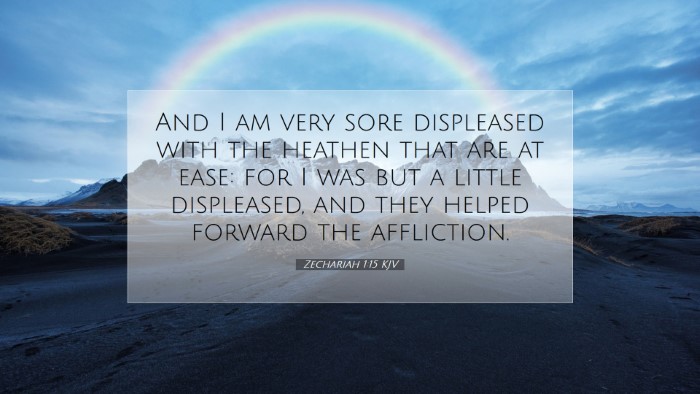Commentary on Zechariah 1:15
Verse Context: Zechariah 1:15 states, "And I am very sore displeased with the heathen that are at ease: for I was but a little displeased, and they helped forward the affliction." This verse is situated within the prophetic revelation given to Zechariah, where the context surrounds the restoration of Jerusalem and the temple.
Insight from Matthew Henry
Matthew Henry’s commentary emphasizes that this verse reveals God's concern for His people, indicating that He is not indifferent to the situations that confront them. The term "heathen" refers to those nations that held power and did not share the same covenant relationship with God as Israel. Henry elucidates that their "ease" implies complacency and a lack of moral integrity in light of Israel's suffering.
- God’s Displeasure: Henry notes that God’s displeasure arises because these nations not only failed to provide help but exacerbated the hardship of God's people. Their actions can be seen as an affront to God’s sovereign care.
- The Contrast of Affliction: The phrase "I was but a little displeased" denotes that God's initial displeasure was temporary and punitive, meant to discipline Israel for their sins. However, the heathen made matters worse, suggesting that their actions went beyond just indifference.
- The Call to Repentance: There is an underlying message that calls for acknowledgment of God’s authority and the inevitability of divine justice.
Insight from Albert Barnes
Albert Barnes, in his thorough examination of the text, highlights the implications of God’s discontent toward the surrounding nations. Barnes notes that the "affliction" referenced is not merely historical but carries a prophetic weight for nations that oppose God’s establishment.
- Divine Providence: Barnes interprets this passage as a reflection of divine providence, emphasizing that even during times of Israel's discipline, God remained aware and concerned about their suffering.
- Justice and Retribution: He posits that God’s pronouncement of displeasure also foreshadows judgment for those nations that have added to the woes of Israel. He reminds readers that divine justice is inevitable for those who mock or misjudge God's people.
- The Nature of Evil: Barnes connects the idle ease of the heathen as a form of active evil, suggesting that their lack of engagement or responsibility contributes to a broader moral decay in the world.
Insight from Adam Clarke
Adam Clarke provides a pastoral reflection on Zechariah 1:15. He suggests that this verse holds implications for the relationship between God's people and oppressive regimes, drawing parallels with contemporary issues of injustice.
- Empathy and Action: Clarke encourages an empathetic response from believers when observing injustices faced by the oppressed. He underlines that passive observation mirrors the complacency of the heathen in the text.
- Understanding God’s Purpose: Clarke asserts that God’s judgments are not only punitive but serve a purpose in refining His people and demonstrating His sovereignty even amidst adversity.
- The Importance of Righteousness: He emphasizes the call to righteousness and the responsibility of the faithful to act against oppression, underscoring the historical relevance of this passage for both ancient Israel and modern-day believers.
Theological Reflections
The combined insights from these commentaries reflect a multi-faceted understanding of Zechariah 1:15:
- God's Sovereignty: It reiterates the overarching theme of God's sovereignty over nations. His displeasure with the complacence of those opposed to His people emphasizes the idea that all nations are ultimately accountable to Him.
- Hope for Restoration: The message also provides hope for restoration, revealing that despite current affliction, God is active and plans for eventual vindication of His people.
- A Warning to Nations: The verse serves as a warning to nations today about the consequences of inaction in the face of injustice, encouraging believers to advocate for those suffering while trusting in God's ultimate justice.
- Call to Vigilance: It highlights the need for vigilance in maintaining a proactive faith that resists complacency and seeks to align with God’s righteous purposes.
Conclusion
In summary, Zechariah 1:15 offers a profound reflection on the nature of divine displeasure towards complacent nations amidst the suffering of God’s people. The utilitarian interpretations provided by Matthew Henry, Albert Barnes, and Adam Clarke invoke a sense of responsibility among readers, urging them to engage actively with issues of justice and to recognize God's ultimate authority in human affairs. For pastors, theologians, and scholars, this verse acts as an invitation to present both the challenges and the hope inherent in the faithful journey of God’s people, reaffirming that God’s justice and mercy are intricately linked in the tapestry of biblical revelation.


